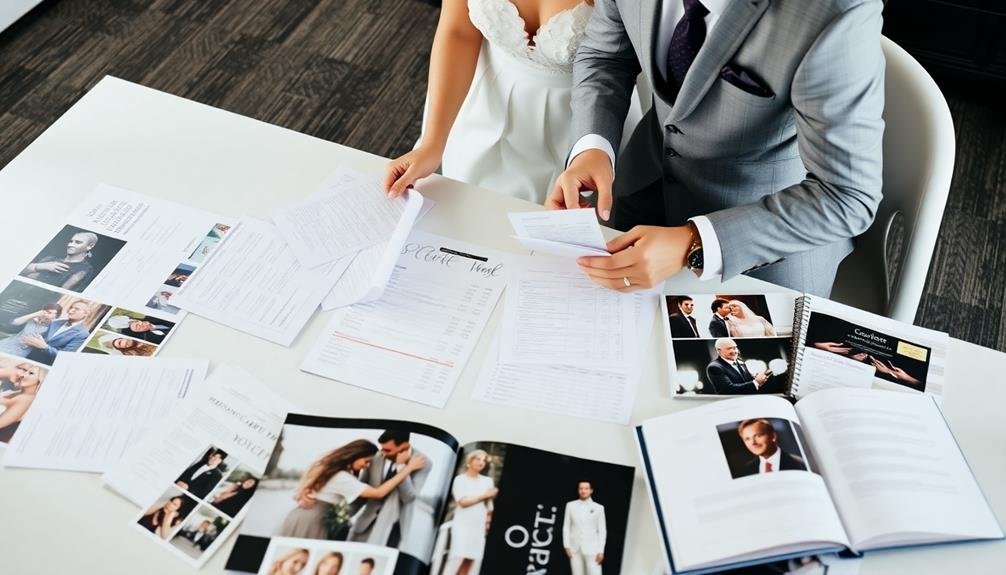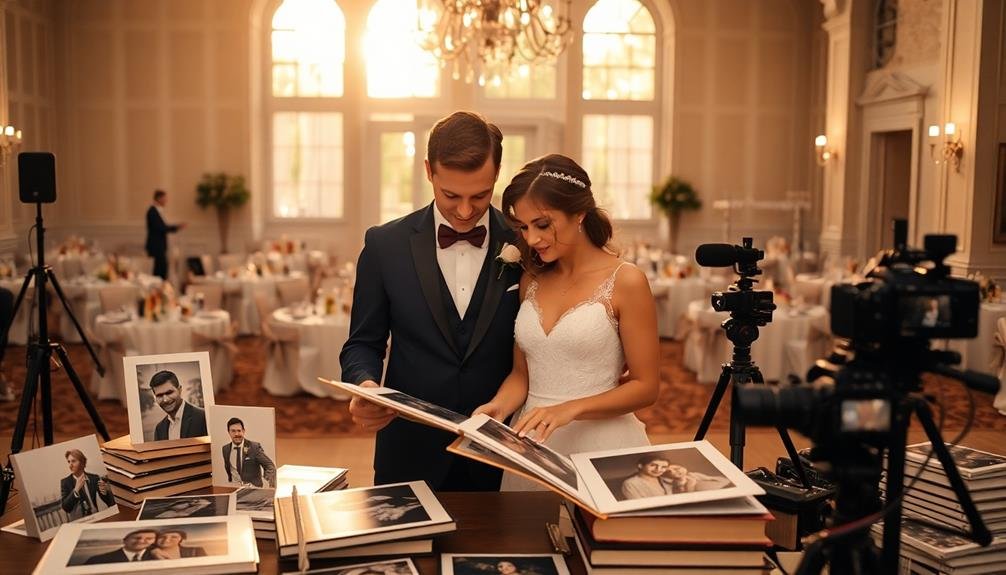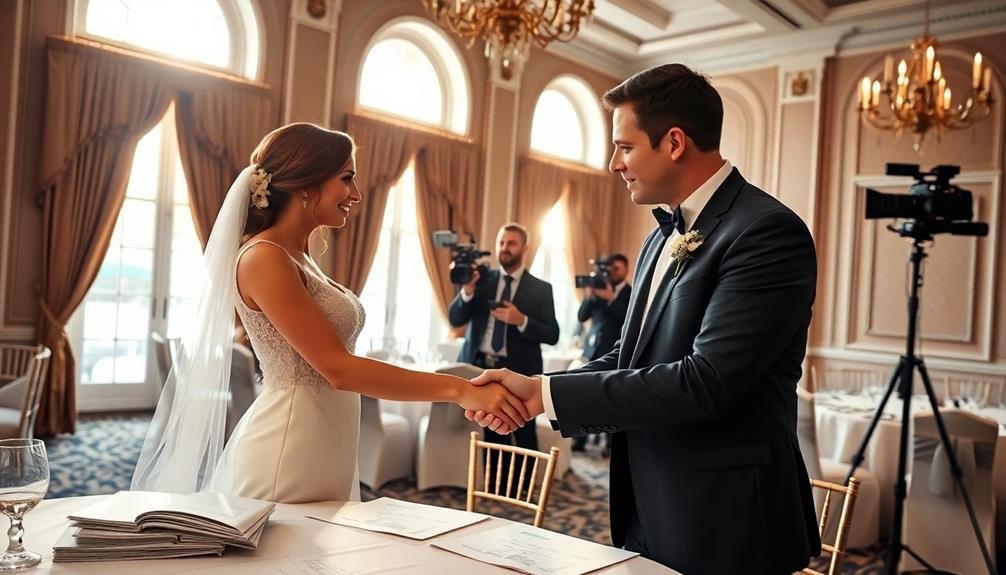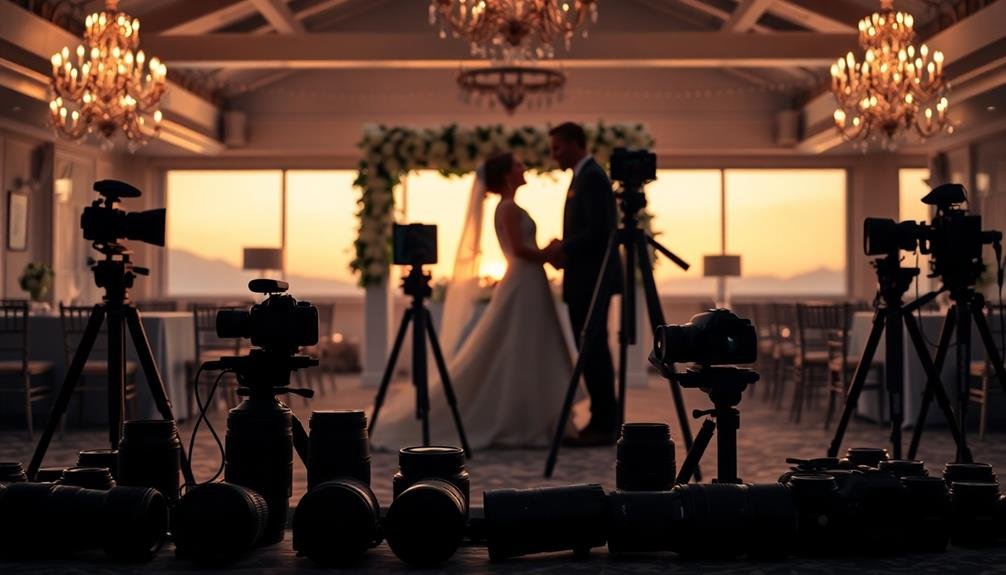To create a wedding photography and videography budget breakdown, start by allocating 10-15% of your total wedding budget for these services. Research local market rates and compare packages from different vendors to understand pricing structures. Prioritize your must-have services and consider bundle deals that offer both photography and videography. Don't forget to factor in additional expenses like travel costs, extra hours, and album printing. Once you've narrowed down your options, schedule meetings with potential vendors to discuss your vision and negotiate terms. By following these steps, you'll be well-equipped to create a thorough budget that meets your needs and expectations.
Key Takeaways
- Allocate 10-15% of your total wedding budget for photography and videography services.
- Research local market rates and compare prices for similar services across multiple vendors.
- Prioritize essential services and create a list of must-haves versus nice-to-haves for your coverage.
- Calculate additional expenses like travel costs, extra hours, prints, and equipment rentals.
- Negotiate package inclusions, pricing, and customization options before finalizing the contract with your chosen vendor.
Determine Your Overall Wedding Budget

Before diving into your wedding photography budget, it's important to establish your overall wedding budget. This vital first step will help you allocate funds appropriately across all aspects of your big day.
Start by discussing with your partner and any family members who might be contributing financially. Consider your savings, income, and any potential loans you're willing to take on for the wedding.
Once you've determined your total budget, break it down into categories. Typically, couples allocate about 10-15% of their total budget to photography and videography. However, this percentage can vary based on your priorities. If capturing memories is at the top of your list, you might want to allocate a larger portion.
Remember to factor in additional costs beyond the basic package, such as engagement shoots, additional hours, or special editing requests.
Also, consider your venue and location, as these can impact photography costs. Destination weddings or hard-to-access venues might require travel fees or additional equipment.
Research Local Market Rates

Armed with your overall budget, it's time to plunge into researching local market rates for wedding photographers.
Start by browsing online directories, wedding websites, and social media platforms to find photographers in your area. Create a list of potential candidates and visit their websites to get an idea of their pricing structures.
Don't hesitate to reach out directly to photographers for detailed quotes. Many offer customizable packages, so you'll want to understand what's included in each tier.
Compare prices for similar services across different vendors to gauge the average cost in your region.
Keep in mind that factors like experience, equipment quality, and demand can influence a photographer's rates. Also, consider the time of year and day of the week for your wedding, as peak seasons and weekend dates often come with higher prices.
Look for reviews and testimonials from previous clients to assess the quality of work relative to the price.
This research will help you determine a realistic budget allocation for photography services and guarantee you're getting fair value for your investment.
Prioritize Services and Packages

With your research complete, it's time to prioritize the services and packages that matter most to you. Consider what aspects of wedding photography and videography are essential for capturing your special day. Think about the coverage hours, number of photographers or videographers, and additional services like engagement shoots or photo albums.
Create a list of must-haves and nice-to-haves, then rank them in order of importance. This will help you make informed decisions when comparing packages from different vendors. Remember, you can often customize packages to fit your needs and budget.
| Priority | Photography | Videography |
|---|---|---|
| High | Full-day coverage | Ceremony + Reception |
| Medium | Engagement shoot | Highlight reel |
| Low | Photo booth | Raw footage |
When evaluating packages, look for value rather than just the lowest price. Some vendors may offer bundle deals that include both photography and videography services, potentially saving you money. Don't forget to factor in any add-ons or extras that might increase the final cost. By prioritizing your needs and understanding what's included in each package, you'll be better equipped to allocate your budget effectively and choose the right vendor for your wedding day.
Calculate Additional Expenses

Calculating additional expenses is essential when budgeting for wedding photography and videography. Beyond the base package, you'll need to contemplate several other costs that can greatly impact your overall budget.
First, factor in travel expenses if your chosen photographer or videographer isn't local. This may include mileage, accommodation, and meals.
Next, think about any additional hours you might need beyond the standard coverage time. Many couples opt for extra hours to capture pre-ceremony preparations or late-night festivities.
Don't forget about prints, albums, and digital files. While some packages include these, others charge extra. If you want a high-quality wedding album or large prints for your home, budget accordingly.
Also, consider engagement shoots or rehearsal dinner coverage, which are often add-ons.
Equipment rentals, such as additional lighting or specialty lenses, may incur extra costs.
Negotiate and Finalize Contracts

Once you've crunched the numbers and determined your budget, it's time to hammer out the details with your chosen photographer or videographer. Start by scheduling a meeting to discuss your vision, expectations, and any specific requests you have for your wedding day coverage.
Be prepared to negotiate on pricing, package inclusions, and additional services you might want.
During the negotiation process, consider the following:
- Ask about package customization options to better fit your needs and budget
- Inquire about discounts for off-peak seasons or weekday weddings
- Discuss the possibility of a payment plan to spread out the cost
When you've reached an agreement, carefully review the contract before signing. Confirm that all discussed terms, including pricing, hours of coverage, deliverables, and deadlines, are clearly stated.
Don't hesitate to ask for clarification on any points you're unsure about. Pay attention to the cancellation and rescheduling policies, as well as any additional fees that may apply.
Once you're satisfied with the terms, sign the contract and provide any required deposit to secure your date. Keep a copy of the signed contract for your records and maintain open communication with your vendor throughout the planning process.
Frequently Asked Questions
How Far in Advance Should I Book My Wedding Photographer and Videographer?
You'll want to book your wedding photographer and videographer as early as possible, ideally 9-12 months before your big day. Popular professionals often get booked quickly, especially during peak wedding season, so don't wait too long!
What's the Typical Deposit Amount for Wedding Photography and Videography Services?
You'll typically find wedding photography and videography deposits ranging from 25% to 50% of the total package price. It's common to pay this upfront to secure your date. The remainder is usually due before or on your wedding day.
Are Travel Fees Included in Most Wedding Photography and Videography Packages?
Travel fees aren't usually included in standard wedding photography and videography packages. You'll often need to pay extra for travel beyond a certain distance. It's best to ask your chosen vendors about their specific travel policies.
How Long Does It Usually Take to Receive the Final Edited Photos and Videos?
You'll typically receive your final edited photos within 4-8 weeks after your wedding. For videos, it can take 8-12 weeks. However, timelines vary by photographer and videographer, so it's best to discuss this during your initial consultation.
Can I Request Specific Editing Styles or Filters for My Wedding Photos and Videos?
You can definitely request specific editing styles or filters for your wedding photos and videos. It's best to discuss your preferences with your photographer and videographer before the wedding. They'll work with you to achieve your desired look.
In Summary
You've now got a solid plan for budgeting your wedding photography and videography. Remember, it's all about balancing your vision with your financial reality. Don't be afraid to communicate openly with vendors and negotiate when necessary. By doing your research and prioritizing what's most important to you, you'll guarantee that your special day is beautifully captured without breaking the bank. Stay flexible and keep your ultimate goal in mind throughout the process.

I’m Sarah, the creator and writer behind this site. I’m a wife and a mother of two wonderful kids who keep me on my toes and inspire me daily. My passion lies in creating and organizing memorable events and group activities, where people can come together and make lasting memories.





Leave a Reply